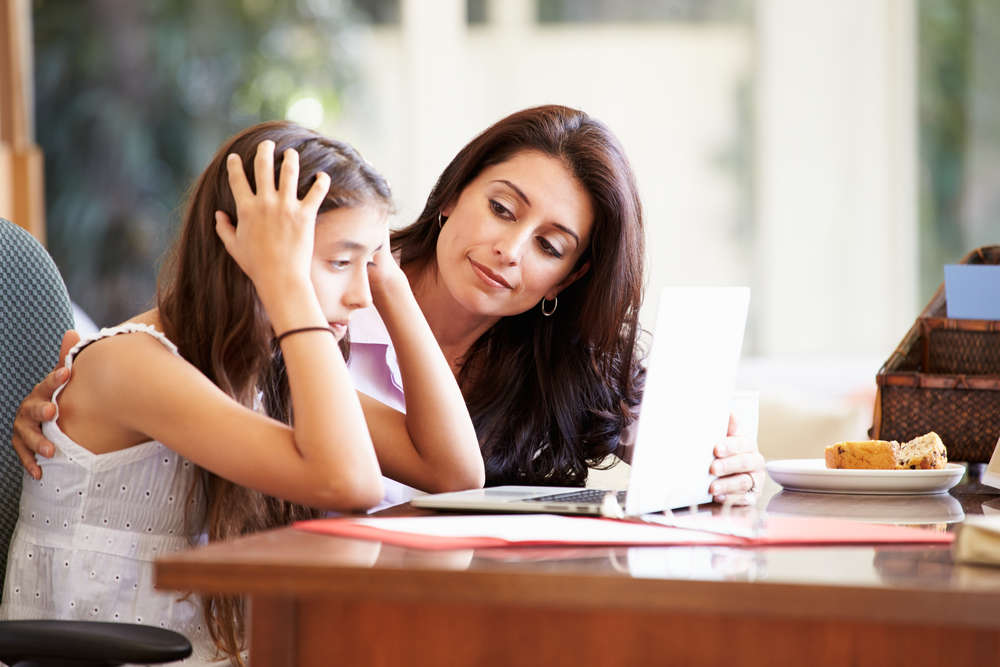Tips For Parenting Your Anxious Child
 Anxiety is one of the most prevalent psychiatric problems experienced by school-age children. Considered to be the most common mental issue, anxiety disorders can start as early as age three and are often considered the gateway to other mental illnesses. Depression, substance use, eating disorders and even suicidal behavior often begin as untreated anxiety.
Anxiety is one of the most prevalent psychiatric problems experienced by school-age children. Considered to be the most common mental issue, anxiety disorders can start as early as age three and are often considered the gateway to other mental illnesses. Depression, substance use, eating disorders and even suicidal behavior often begin as untreated anxiety.
Anxiety disorders tend to run in families – anxious children tend to have anxious parents. Research has estimated that genetics account for approximately 50% of a predisposition toward anxiety disorders. In addition to genetic heritability, studies have found various family dynamics also contribute to childhood anxiety. One important aspect that has been emphasized as strongly contributing to the development of anxiety disorders in children is parenting.
To a parent of an anxious child, a scenario like this may sound familiar:
Little Emma is afraid of dogs. One day, while playing nicely in the sandbox at the park, a little poodle comes running over. Playtime quickly takes a turn for the worse, as little Emma becomes anxious, scared and angrily demands that you take her home NOW! And no, she can’t and won’t wait until her little brother has had a turn on the swings. You try to reason with her, “Look, the little dog is on a leash, it can’t possibly hurt you”. You offer more reassurance, “I’m sure the doggy won’t bite you, it seems so sweet”. But that doesn’t work either and because nothing you do or say can console little Emma, you take her and her little brother home to keep Emma from becoming increasingly upset. A few days later, when you suggest going to the park to play, Emma becomes extremely anxious and refuses to go.
How could the parent have better managed this anxious child?
Here are some tips for parenting an anxious child:
- Validate your child’s feelings. When you see your child overreacting to a situation, it’s easy to dismiss her fears by saying something like, “Don’t be afraid. That little dog is nothing to be scared of”. This rarely works. Instead, simply acknowledge your child’s fear, “I can see you’re really worried about that dog”.
- Help your child face her fears. When encountering a fearful situation, both adults and children’s first instinct is to run away and avoid the situation in the future. Although this might appear to be an effective solution, avoidance never helps to teach the child that she could have handled the situation by remaining in the fearful situation and the child never learns that her fears were probably disproportionate to the threat. The parent could have taken Emma by the hand and watched the dog together, maybe eventually even working up to gently petting it.
- Model being brave. The next time you encounter something that is scary to you, model brave behavior. Watch your own reaction to certain situations. Acknowledge that you are worried, and let your child see you face your fears. This will help to teach your child that being brave doesn’t mean fearlessness. Bravery means doing something even though we’re scared. Remember that our children learn more from what we do than from what we say. By facing our challenges, we show our children that it’s okay to struggle.
- Avoid giving reassurance. This is a difficult one – it’s most parent’s first impulse to reassure their child and tell them that everything is going to be okay. Unfortunately, this strategy often backfires, as the more you give reassurance, the more the anxious child will want it in the future – reassurance seeking can become nearly addictive. Reassurance seeking is very common in children and adults with Obsessive Compulsive Behavior (OCD), but tends to be a problem across all anxiety disorders (e.g. social anxiety disorder, generalized anxiety disorder, panic disorder, specific phobias).
- Reward brave behavior. Giving your child verbal encouragement, privileges and rewards for brave behavior can often be helpful. While the goal is to eventually have your child feel good about her changes as its own reward, setting up incentives can be a helpful step toward encouraging brave behavior. Sticker charts can be a useful tool for setting up reward systems.
At GroundWork Counseling in Orlando, our child therapists specialize in treating anxiety disorders (social anxiety disorder, phobia, generalized anxiety disorder, panic disorder) and Obsessive Compulsive Disorder (OCD) in children and teens. Anxiety disorders can be successfully treated with Cognitive Behavioral Therapy (CBT). When seeking a therapist for your child it is important to interview the perspective therapist, we suggest inquiring about the clinician’s experience and training working with children specifically, we also recommend questioning where the therapist received their specific CBT training, and how they apply evidence-based methods to children.
Recent research at the University of Connecticut and Johns Hopkins University tested an eight-week CBT program for healthy kids who each had at least one parent with an anxiety disorder. During the following year, 31% of kids who didn’t receive CBT therapy developed an anxiety disorder, whereas only 5% of kids who received CBT treatment developed one.
Speak With An Orlando Child Anxiety Therapist
407-378-3000





